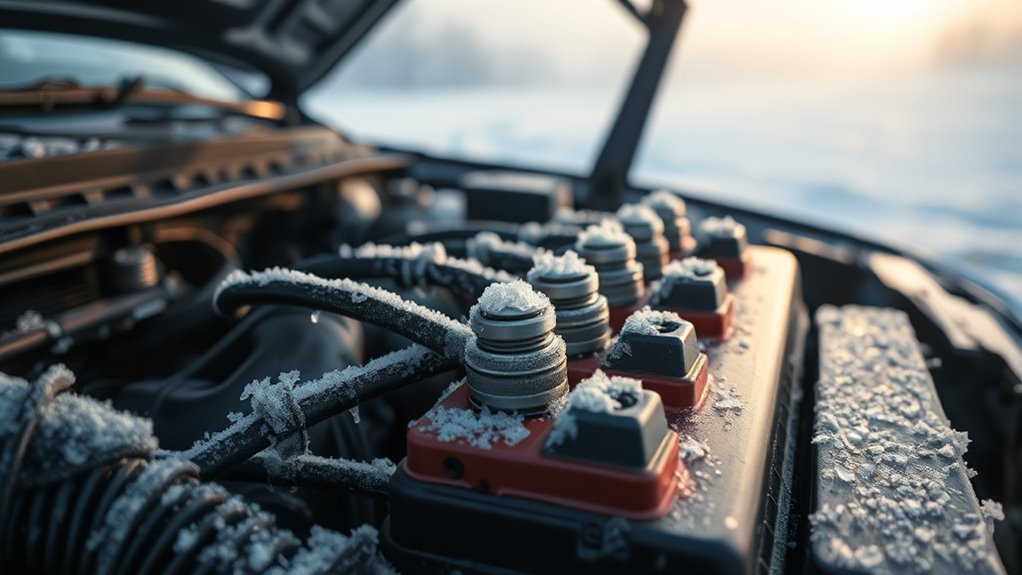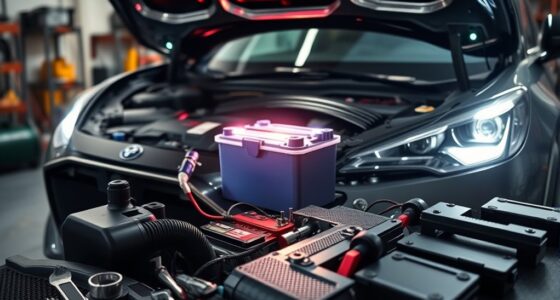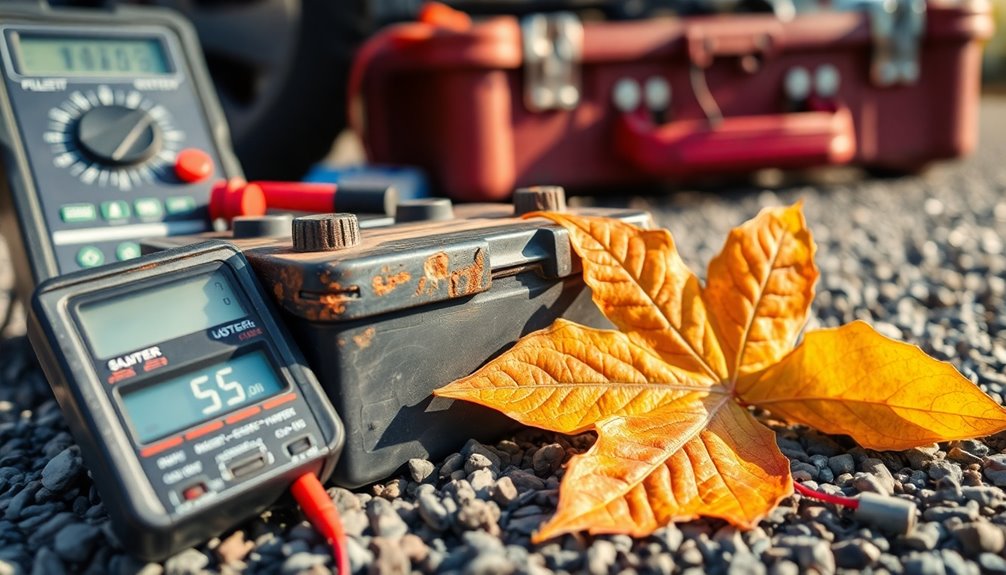On cold winter mornings, your engine struggles to start because your battery loses power in freezing temperatures, and thickened oil makes engine parts harder to turn over. Corrosion on terminals can block electrical flow, further preventing ignition. Using the right winter-grade oil and keeping terminals clean can make a big difference. Interested in discovering simple ways to keep your engine running smoothly despite the chill? Keep exploring for helpful tips.
Key Takeaways
- Cold temperatures reduce battery capacity and slow chemical reactions, making engine startup difficult.
- Battery corrosion on terminals blocks electrical flow, impairing engine starting in winter.
- Thickened engine oil due to cold increases resistance, straining the starter and battery.
- Diminished battery power and sluggish engine components compound cold start problems.
- Proper maintenance, including terminal cleaning and winter-grade oil, can prevent winter starting issues.

Winter mornings often hit hard, leaving you feeling sluggish and unmotivated as cold air seeps into your bones. When you try to start your car, it might refuse to turn over, adding frustration to an already tough morning. The cold weather plays a significant role in this struggle, but understanding why your engine won’t crank can help you take steps to prevent it from happening again. Two common culprits are battery corrosion and engine oil viscosity, both of which are exacerbated by low temperatures.
Battery corrosion is a frequent issue during winter. Over time, a white, powdery substance can build up on the battery terminals, blocking the flow of electricity. When this happens, the battery can’t supply enough power to turn the engine over, especially in cold weather when your battery’s capacity is naturally weakened. Cold temperatures cause chemical reactions inside the battery to slow down, reducing its ability to deliver the necessary current. If you notice sluggishness when starting or dimming headlights, it might be time to check for corrosion and clean your terminals. A simple wire brush and some baking soda solution can do wonders, restoring proper electrical flow and giving your battery a better chance to perform in the cold.
Another key factor is engine oil viscosity. As temperatures drop, oil thickens, turning from a smooth, flowing liquid into a more sluggish substance. When your engine oil becomes too viscous, it creates additional resistance during startup, making it harder for the engine to turn over. This is why many manufacturers recommend using winter-grade or synthetic oils designed to stay thin in low temperatures. Switching to a lower viscosity oil during winter can help your engine turn over more easily, reducing strain on the battery and starter. Keep in mind, however, that using oil with the wrong viscosity can lead to increased wear and tear over time, so always follow your vehicle’s recommendations.
In addition to addressing battery corrosion and choosing the right oil viscosity, other factors like cold engine components and fuel issues can contribute to hard starts. But focusing on these two areas can make a big difference. Regular maintenance—checking your battery, cleaning terminals, and switching to appropriate oil—can help ensure your engine cranks without a fight, even on the coldest mornings. Paying attention to relationship issues that may affect your vehicle’s condition, such as neglect or improper care, can also make a difference. So, before you curse the winter weather, take a moment to give your car some TLC. Doing so might just save you from a frustrating, stranded start-up tomorrow.
Frequently Asked Questions
Can Cold Weather Damage My Car’s Battery Permanently?
Cold weather can indeed cause damage to your car’s battery, especially if it leads to corrosion on the terminals or causes charging problems. When temperatures drop, your battery’s capacity decreases, making it harder to start your engine. If you notice corrosion or difficulty charging, it’s a sign you should get your battery checked. Regular maintenance, like cleaning terminals and ensuring proper charging, helps prevent permanent damage from winter conditions.
How Can I Prevent My Engine From Freezing Overnight?
To prevent your engine from freezing overnight, you should prioritize battery maintenance and check antifreeze levels regularly. Make certain your battery is fully charged and clean, as cold weather strains it. Top off antifreeze levels with the correct mixture to prevent freezing. Using a engine block heater or parking in a garage also helps keep your engine warm. These steps protect your vehicle and make morning starts smoother.
Is Using Engine Block Heaters Effective in Winter Mornings?
Using engine block heaters is highly effective on winter mornings. They warm your engine and fluids, making it easier to start your vehicle in cold temperatures. By plugging in your block heater overnight, you’ll notice quicker starts, less strain on your battery, and reduced wear on engine components. Overall, engine block heaters are a dependable solution to guarantee your vehicle cranks up smoothly during harsh winter mornings.
What Are Signs of a Failing Starter Motor in Cold Temperatures?
If you notice your engine struggles to start in cold temperatures, you might be facing starter motor issues. Common cold start symptoms include slow or labored cranking, a clicking sound when turning the key, or the engine not engaging at all. These signs indicate your starter motor may be failing or weak, especially in chilly weather. Addressing these symptoms early can prevent a complete failure and get you moving smoothly again.
Does Winter Weather Affect Fuel Efficiency Significantly?
Winter weather can considerably impact your fuel efficiency. Cold temperatures increase air density, which can improve combustion but may also cause your engine to work harder. Additionally, fuel dilution from condensed moisture can reduce fuel quality, leading to decreased efficiency. You might notice you’re using more fuel during winter months because your engine compensates for these changes, so staying aware and maintaining your vehicle helps optimize performance.
Conclusion
As you finally turn the key, it’s almost as if the cold morning weather conspired with your engine’s stubbornness, making you wonder if it’s just bad luck. But really, it’s a reminder that even the smallest coincidences—like the chilly air—can cause big frustrations. Next time, a quick check of your battery or a warm start might just save you from this winter morning blues. Sometimes, it’s those little details that make all the difference.










